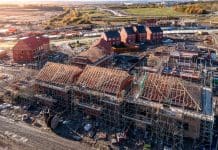Joseph Daniels, CEO and founder of Etopia Group, and an independent net-zero adviser to the government, argues that modern methods of construction can not only address some of the most acute problems affecting UK housebuilding, but also looming energy and economic issues
Despite remaining resilient for the best part of 2021, the construction sector is still navigating rough waters thanks to stalling productivity levels, skills shortages and rising inflation.
Therefore, it has never been more important for the industry to adopt innovation that will, to some degree, help companies of all sizes overcome some of the biggest structural problems.
Recent statistics from the Department for Levelling Up, Housing& Communities (DLUHC) revealed that housing output is flatlining, with completions falling by around 4% year-on-year between July and September 2021. Global supply chain issues are undoubtedly taking a toll on productivity levels, as seen in various other surveys, while a shortage of skilled labour is leading to developers taking a slightly more pessimistic view on long-term outlooks. The Construction Industry Training Board reckons the sector will need 216,00 new workers in three years to meet growing demand.
Tackling the skills shortage
Meanwhile, the House of Lords’ Built Environment Committee has laid bare the problems housebuilding faces in the Meeting the UK’s Housing Demand report. The product of a six-month inquiry, the paper reveals that the role of SMEs in the housebuilding industry has collapsed, while uncertainty and delays to planning reform have created further problems.
But among many of the sensible solutions the report proposes, one should stand out: increasing the adoption of modern methods of construction (MMC) to address some of the sector’s most acute problems. You only have to reach the 12th page of the 110-page document to find that the committee sees MMC as a means of alleviating the skills shortage and delivering homes with fewer defects.
The paper is right to make these assumptions.

Etopia Group’s factory in Cheshire, which is capable of creating 2,000 precision-engineered homes a year, draws from a talent pool spanning digital design, robotics and artificial intelligence. The automation of production through MMC is one way of relieving the pressure on traditional trades. Make Modular, a recently established trade body created to promote the offsite housing sector, reckons MMC can introduce up to 50,000 flexible future economy jobs where they are needed in the UK.
DLUHC’s director of housing markets and strategy Emma Fraser has also rightly pointed out: “The shift to modern methods of construction is going to be a really important driver of changes in the skill base in the industry.”
By precision-engineering homes along production lines, MMC providers, such as ourselves, are also able to “design-out” defects thanks to the ability to benchmark quality at various stages of the manufacturing process. Digital design tools allow us to deliver superior accuracy, with robotics helping us to leave no room for error.
Given the industry’s reputation for shoddy design, the importance of this cannot be understated, with the University College of London finding in a 2020 report that “greedy” housebuilders are designing just 26% of homes well. At the time of publication, the report found that three-quarters of new homes constructed by large builders are of “mediocre” or “poor” design quality, with one in five so bad they should never have been given planning permission.
While affording industry-specific solutions, MMC also possesses the ability to address some of the UK’s most pressing societal problems.
Energy bills are expected to soar in April, almost doubling for some households. The Resolution Foundation reckons that 6.3m householders will be plunged into fuel poverty overnight. At present, 9% of households suffer fuel stress but will hit 27% if the price cap rises by more than half to about £2,000 a year as expected on 1 April. Ofgem, the energy regulator, will announce the new price cap level on 7 February but drastic rises in wholesale gas prices mean a large increase is all but inevitable.
For decades, the housebuilding industry has failed to deliver homes that are both airtight and energy efficient. In contrast, the homes that roll off our production lines, such as those delivered at our The Avenue development in Corby, surpass the highest A energy performance rating, scoring 105/100.
While housebuilding may not be able to do much on the geopolitical stage, where energy supply is arguably being weaponised, the sector can up its game in improving levels of energy efficiency. High levels of airtightness and improved building fabrics can translate into huge cost savings for consumers and the likes of cash-strapped councils, who often are responsible for subsiding energy costs for social housing tenants.
Looking ahead to 2022 and beyond, the government, which has already lent its support to the sector in more ways than one, must look to MMC as a means of joining up economic, housing and energy policy in order to address the industry’s and country’s most prominent structural problems.
Joseph Daniels
CEO and founder 
Etopia Group
Tel: +44 (0)20 3781 8444














